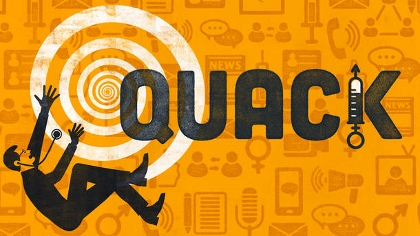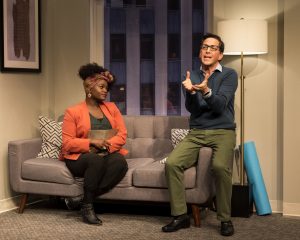WALKS LIKE A DUCK, QUACKS LIKE A HIT
Playwright Eliza Clark, in notes about Quack, her new play now in its world premiere at the Kirk Douglas Theatre in Culver City, writes that she has been thinking a lot about privilege and entitlement, and the scary forces coming out of the woodwork in America. As she was writing it, she was also thinking about what it means to be a woman in the workplace and how men and women are shamed differently.
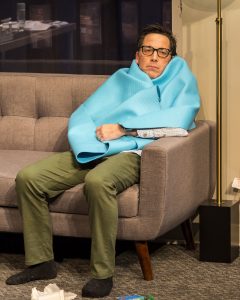 She explores these themes in Quack with gusto and great comic skill. Funny lines crackle. Angry ones hit bullseye after bullseye. Depth of feeling creeps up on you, as Ms. Clark exhibits a keen understanding of human frailty and of how hard it is, perhaps impossible, to control the addictions of fame, power, and wealth.
She explores these themes in Quack with gusto and great comic skill. Funny lines crackle. Angry ones hit bullseye after bullseye. Depth of feeling creeps up on you, as Ms. Clark exhibits a keen understanding of human frailty and of how hard it is, perhaps impossible, to control the addictions of fame, power, and wealth.
This is the way we live now. The outcome is unsettling and surprisingly impactful. We are all trapped. As it happens, the night before Quack opened, I saw Johnny Got His Gun, a tale of a severely wounded soldier without arms, legs, hearing, or a way to speak. In Quack, television personality Dr. Irving Baer may have arms and legs, but unless others are saying whatever feeds his ego, he can’t hear. And though he talks constantly, he can’t truly speak.
(Dr. Baer has a very funny, very rehearsed speech about how doctors have been venerated since the Caveman. It gets bigger laughs with each callback. We judge his vanity, yet if we are honest enough to cop to it, we relate. Who among us does not have some canned pearl of wisdom speech we recite at the drop of a hat at gatherings? Usually our spouses or close friends just roll their eyes and hope it is over as quickly as possible.)
As the play opens, a very unflattering article has just come out about Dr. Baer. Kelly is his assistant, co-worker, television segment presenter, mentee, and in a haphazard way, he thinks, possibly his soulmate. Dr. Baer vacillates hilariously between telling Kelly not to read the article to him while demanding she give him all the details. He brainstorms responses, and every time he thinks he has a good one, he happily shouts, “Write that down!” Kelly does. Every time.
The most devastating accusations in the article unfold slowly. The headline is, “If it walks like a duck’¦” Kelly blunders her way apologetically explaining the obvious. The inference is that Dr. Baer is a quack. At first it seems like mere bad press. Soon we realize it is a potentially career-ending hatchet job. Two unvaccinated kids have died, and others have fallen gravely ill after coming in contact at a public library. Dr. Baer privately believes that vaccines are perfectly safe and absolutely necessary, but a large portion of his audience is anti-vax, subscribing to the magical thinking of affirmations and holistic health.
The trouble is, he has refused to take a firm public stand against the anti-vaxers, and now two kids are dead. He is arguably the most famous doctor in America, but he may have been negligent in performing his duty to public health. Baer is incredulous. ”Does everyone need a flu shot?” he posits. “ I don’t know, I’m an endocrinologist!” He insists the parents who didn’t vaccinate their kids are responsible for those deaths. They made a choice. Besides, when the deaths happened, “I was in the Hamptons! I wasn’t at that library spreading measles germs on the pages of ’˜Goodnight Moon!’”
He is tone deaf to any suggestion that he take even the smallest amount of responsibility, nor will he issue a public apology, sincere or otherwise. But he grows increasingly frantic and upset, though he insists it is because he is angry at his jealous non-famous doctor friends he believes gave the journalist negative interviews. He argues that no one in America wants to take responsibility for their own actions. Kelly wonders if it is just that his feelings are hurt. He dismisses the idea out of hand. As a TV personality, “I have been vaccinated against hurt feelings.”
A further complication is his wife, Meredith. They have a successful business together, Mer-Baer (pronounced “Mare-Bear”). The company sells the sort of herbal diet drugs and cleansing products beloved by anti-vaxers. It is Meredith’s creation and she runs the operations. Baer cites a healthy non-judgmental attitude as his reason for not forcefully arguing against the anti-vaxers. But is it really just a case of a conflict of interest? Is he merely protecting his lucrative business?
Meredith is caustic and demanding. When she storms into the office, upset about the article, she demands of Kelly, “A water, room temperature, a half lemon, and no seeds.” When she spots a single seed it isn’t pretty. Flustered, Kelly fishes it out of the glass with her finger. The audience roars.
Meredith rails against their Schadenfreude-driven friends rubbing her face in the article. “Mother fucking cunt fuck motherfuckers!” she yells, blasting one of them as a “Fucking look at me, look at me in my Tesla bitch!”
The heat keeps rising. Kelly tries to buck Baer up by talking about how much he has taught her. She uses his advice to “manifest her best life.” I won’t spoil the priceless joke that emerges. She is keen to Baer’s every mood swing and need. “I’d like to be alone now,” he says. She waits. Then, as if it part of the same sentence, he asks, “Can you come sit next to me?” She does.
Against everyone’s better advice, Baer meets River, the writer of the article. She is a woman of color and a sort of intersectional warrior who has lost 200 pounds, through regular diet and exercise. “In 18 months? With just diet and exercise?” asks Baer with disbelief. Absolutely. “You look a lot younger than you are on Google,” he says. ”Okay,” she responds, unwilling to take it as anything resembling a compliment.
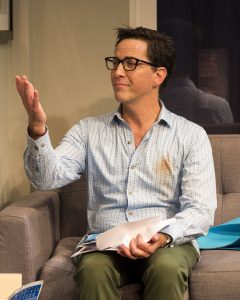 Elsewhere in the play, though, characters often misconstrue plain statements as compliments. “You’re a powerful public figure,” River tells Baer. “Thank you,” he replies. Someone mentions reading someone’s book. “Thank you.” Or reading an article someone has written, or an article about that person. “Thank you.” It is very effective and quite funny.
Elsewhere in the play, though, characters often misconstrue plain statements as compliments. “You’re a powerful public figure,” River tells Baer. “Thank you,” he replies. Someone mentions reading someone’s book. “Thank you.” Or reading an article someone has written, or an article about that person. “Thank you.” It is very effective and quite funny.
River seems reasonably skeptical about Baer’s unwillingness to take a stand against anti-vaxers. Privately, Kelly agrees. She has been advising that he should firmly support childhood vaccines. But he even turns down a request from Good Morning America to vaccinate a child on-camera. Baer’s world begins to fall apart and he searches for a way to fight back. He turns to an unlikely ally, the leader of a “men’s rights” group named Brock who has been publicly supportive of Baer online. Brock is gaining a public profile advocating for white guys who lose their jobs to “unqualified” women and people of color and also for men who lose their children to villainous, lazy ex-wives.
No spoilers. Plot twists take you by surprise then seem inevitable, with people behaving in ways that are as completely in character as they are ill-advised. The forward momentum never falters. In the beginning the show seems deceptively like a sit-com. That would be fine. But it has a lot more on its mind. Quack is that rarest of projects, a fully realized commercial stage comedy that isn’t afraid to tackle moral ambiguity. This production is an unqualified success. I can easily imagine it on Broadway.
In five or ten years, even high schools could be staging productions. That is when you know you have written something for the ages. (Though that idea also calls to mind a high school production of A Chorus Line I once saw with a very pregnant 16-year-old student playing “Sheila.” When she asked, “Can the adults smoke?” it brought down the house for all the wrong reasons.)
 Director Neel Keller does wonderful work here. His staging is inventive. The rhythm does not always follow the expected pace of comedy and that is part of what makes the evening so rich. The technical team is terrific, especially set designer Dane Laffrey, who brilliantly utilizes the theater’s turntable.
Director Neel Keller does wonderful work here. His staging is inventive. The rhythm does not always follow the expected pace of comedy and that is part of what makes the evening so rich. The technical team is terrific, especially set designer Dane Laffrey, who brilliantly utilizes the theater’s turntable.
Dan Bucatinsky is superb as Baer, doing slow comic burns and taking no prisoners. He does not seem afraid of making the character unsympathetic, which, conversely, is what allows us to sympathize. He is a putz, but you don’t want him to lose everything. Jackie Chung manages an extraordinary feat as Kelly, embodying her anxious eagerness to please, but believably reaching a place where she can no longer deny her own value. You can imagine the role played broader, with more slapstick and adherence to supposedly tried-and-true methods of wringing humor out of every line. Ms. Chung is smarter than that. Her work is so resonant because she builds the performance with great skill and patience.
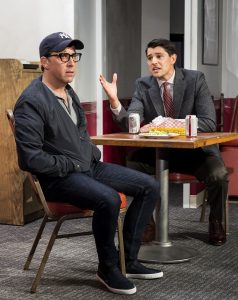 As Meredith, Jessalyn Gilsig plays such a perfect bitch that it is something of a shock when you start caring about the character. As with Mr. Bucatinsky, Ms. Gilsig gains sympathy by approaching her role without fear, embracing Meredith’s anger and selfishness, which, in turn, allows her moments of true self-awareness to have real impact.
As Meredith, Jessalyn Gilsig plays such a perfect bitch that it is something of a shock when you start caring about the character. As with Mr. Bucatinsky, Ms. Gilsig gains sympathy by approaching her role without fear, embracing Meredith’s anger and selfishness, which, in turn, allows her moments of true self-awareness to have real impact.
Nicholar D’Agosto approaches Brock with ease, humor, and logic. You can easily imagine how this man with hateful views could come across as reasonable and fair-minded on television. You like him, then pinch yourself. Shoniqua Shandai is excellent as River, the plucky investigative reporter with her own secrets and lies. Ms Shandai is persuasive, but for me, River is one character where Ms. Clark loads the dice a little too much. River’s defense for essentially ruining Dr. Baer’s life is too glib. We know instantly that her reasons will turn out to be deeper and more personal.
No one other than Brock comes out ahead in this story. What Ms. Clark is getting at, though, is more than a tale of winners and losers. River ends up suffering far more devastating consequences than Baer. As a once-poor woman of color from a fly-over state, there’s no coming back for her. As a wealthy white man with tens of millions of dollars in the bank, Dr. Baer always has options. That he will find these options unpleasant is likely. That they will allow him to keep every bit of his wealth and privilege is clear. And awful. Quack leaves us a little freaked out. It perfectly reflects our world. God help us.
photos © 2018 Craig Schwartz Photography
Quack
Center Theatre Group
Kirk Douglas Theatre, 9820 Washington Blvd in Culver City
Tues-Fri at 8; Sat at 2 & 8; Sun at 1 & 6:30
ends on November 18, 2018
for tickets, call 213.628.2772 or visit CTG
